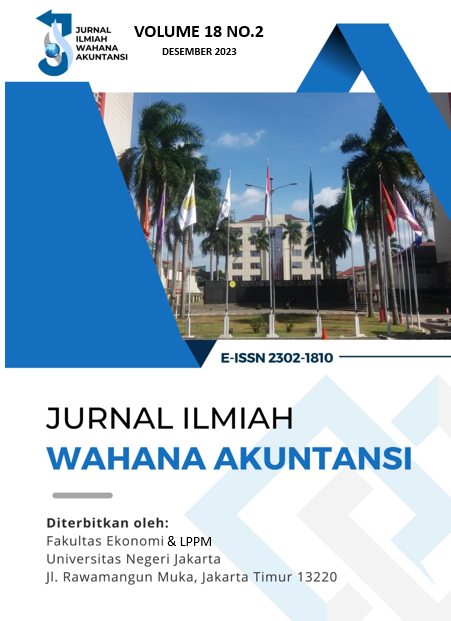Legalitas dan Akuntabilitas Keuangan Lembaga Filantropi dalam Keuangan Sosial Islam
DOI:
https://doi.org/10.21009/Wahana.18.025Keywords:
Akuntabilitas, Keuangan Sosial Islam, Legalitas, Lembaga FilantropiAbstract
The practice of Islamic philanthropy that is rooted in the traditions of Indonesian society in the form of zakat, infaq, shadaqoh and waqf (ZISWAF) is growing, mainly due to the widening gap between rich and poor people and various natural disasters that come one after another. The role of the institution philanthropists Islam and the institution of amil zakat (LAZ) help many people who need help. The role of Islamic philanthropic institutions with the collection and allocation of zakat, infaq, sadaqah, and waqf (ZISWAF) funds provides benefits to the wider community in the economic development of the Ummah.
This study aims to describe financial accountability for the management of funds of Islamic philanthropic institutions in the economic development of the Ummah. The data used in this study is secondary data obtained from the website of Indonesian philanthropic institutions. A total of 5 samples registered on the website of Indonesian religious philanthropic institutions. This study used quantitative methods using descriptive analysis. The results obtained were the Accountability of 5 philanthropic institutions that were sampled in the good category based on the results of indicators of accessibility and availability of financial statements. This research is useful for academics, philanthropic institutions and government
References
Abidin, Zaenal (2012). Manifestasi dan Latensi Lembaga Filantropi Islam dalam Praktik Pemberdayaan Masyarakat, Suatu Studi di Rumah Zakat Kota Malang,Jurnal Studi Masyarakat Islam, Volume 15, No. 2.
Agustinawati, V., & Mawardi, R. 2018. Memaknai Amanah Atas Praktik Akuntabilitas pada Organisasi Amil Zakat Nurul Hayat Surabaya. Jurnal Akuntansi Universitas Jember, 16 (2), 119–129.
Al-Mubarok, F., & Muslim, A. B. M. B. (2020). Kesalehan Sosial melalui Pendidikan Filantropi Islam. JIEBAR: Journal of Islamic Education: Basic and Applied Research, 1(1), 1- 15.
Badan Zakat Nasional, https://baznas.go.id/
Badan Wakaf Alqur'an,https://www.wakafquran.org/
CAF World Giving 2021, https://www.cafonline.org/about-us/publications/2021-publications/caf-world-giving-index-2021
Diani, Rosita (2016). Analisis Determinan Laporan Keuangan di Internet oleh Pemerintah Daerah di Indonesia.
Hanifah, Fika (2017). Pengaruh Kompetensi Politik, Indeks Pembangunan Manusia dan Leverage Terhadap Ketersediaan dan Keteraksesan Informasi Keuangan Daerah pada Website Resmi Pemerintah Daerah di Indonesia.
Dompet Dhuafa. https://www.dompetdhuafa.org/
Keanggotaan Filantropi Indonesia. https://filantropi.or.id/keanggotaan/anggota-filantropi-indonesia
I Made, Y. P. D., & Rasmini, N. K. 2019. Pengaruh Akuntabilitas, Transparansi, dan Partisipasi Masyarakat pada Efektivitas Pengelolaan Dana Desa. E-Jurnal Akuntansi, 28 (1), 132–158.
Ihsan, H., Sulaiman, M., Alwi, N. M., & Adnan, M. A. 2017. A Study of Accountability Practice in Dompet Dhuafa Waqf of Indonesia. Journal of King Abdulaziz University, Islamic Economics, 30 (2), 13– 32.
Indrarini, R., & Surya Nanda, A. 2017. Transparansi Dan Akuntabilitas Laporan Keuangan Lembaga Amil Zakat: Perspektif Muzaki Upz BNI Syariah. AKRUAL: Jurnal Akuntansi, 8 (2), 166–178.
Kasdi, A. (2016). Filantropi Islam untuk Pemberdayaan Ekonomi Umat (Model Pemberdayaan ZISWAF di BMT Se-Kabupaten Demak). Iqtishadia: Jurnal Kajian Ekonomi dan Bisnis Islam STAIN Kudus, 9(2), 227-245.
LAZIS NU,https://nucare.id/
LAZIS Muhammadiyah, Lembaga Amil Zakat Muhammadiyah, https://lazismu.org/
Peraturan Bank Indonesia No. 8/4/PBI/2006 mengenai Good Corporate Governance.
POJK No. 55/POJK.03/ 2016 tentang Tata Kelola yang Baik pada Bank Umum atau PBI 11/33/PBI/2009 Pedoman Good Corporate Governance pada Bank Syariah.
Peraturan Menteri Negara BUMN Per 01/MBU/2011 Pedoman Good Corporate Governance untuk BUMN.
Ridwan (2013). Metode dan Teknik Menyusun Thesis. Bandung : Alfabeta.
Rahman, T. 2015. Akuntansi Zakat, Infak dan Sedekah (PSAK 109): Upaya Peningkatan Transparansi dan Akuntabilitas Organisasi Pengelola Zakat (OPZ). Muqtasid: Jurnal Ekonomi dan Perbankan Syariah, 6 (1), 141–164.
Sarwani, Nailiah, R., & Latif, D. M. (2019). Pengaruh Kualitas Laporan Keuangan terhadap Tingkat Penerimaan Kredit serta Implementasi SAK ETAP. Jurnal Riset Akuntansi Keuangan (RAK), 4(1).
Shalehanti Nadia, Irfan Beik (2017). Analisis Kinerja Bazis Jakarta Selatan, Iqtishodia Jurnal Ekonomi Islam Republika.
Setyanto, A. W. E. (2016). Tradisi Persenan bagi Pedagang Pracangan di Pasar Legi Songgolangit Ponorogo Dalam Perspektif Filantropi Islam. Muslim Heritage, 1(1), 37-58.
Sudiyo, S., & Fitriani, F. (2020, January). Lembaga Ziswaf Sebagai Lembaga Filantropi Islam dan Pemberdayaan Masyarakat di Kota Bandar Lampung. In Prosiding Seminar Nasional Pengembangan Teknologi Pertanian.
Saripudin, U. (2016). Filantropi Islam dan Pemberdayaan Ekonomi. BISNIS: Jurnal Bisnis dan Manajemen Islam, 4(2), 165-185.
Tri, Dhea Anggun (2021). Peranan BAZNAS dalam Meningkatkan Perekonomian Jurnal Ilmiah Mustahik, 7-9.
Undang Undang No. 23 Tahun 2011 tentang Pengelolaan Zakat.
Downloads
Published
How to Cite
Issue
Section
License

Jurnal Ilmiah Wahana Akuntansi is licensed under a Creative Commons Attribution-NonCommercial-ShareAlike 4.0 International License.
Articles in Jurnal Ilmiah Wahana Akuntansi are Open Access articles published under the Creative Commons CC BY-NC-SA License. This license permits use, distribution and reproduction in any medium for non-commercial purposes only, provided the original work and source is properly cited. Any derivative of the original must be distributed under the same license as the original.











